We truly live in a global marketplace. When you sell online, there’s no need to limit your customer base to your city, state, or even country. Border-free shopping means the world is your audience.
But what’s the best way to start shipping internationally?
Well, that depends on the type of online store you’re operating, which countries you’re interested in shipping to, and your available resources for managing international orders. Not only will you need to make sure that your ecommerce business is set up properly to sell and ship products internationally, you’ll need to provide a great delivery experience for the customer as well.
To help you start shipping internationally, we’ve put together this step-by-step guide. We’ll discuss international shipping tips and walk you through how to:
- Develop your international shipping strategy.
- Ensure compliance with international laws and customs regulations.
- Set up your website for international ecommerce.
- Build an international client base.
- Offer an exceptional international shipping experience for your customers.
A note regarding changes in U.S. tariff policies
We know that recent shifts in tariff policies for the United States have caused worry and uncertainty for businesses across the world. To help merchants navigate these changes, Avalara (one of our valued tax partners) has published and is frequently updating an article on their blog, which can be read here.
Develop your international shipping strategy
↑ Back to top1. Identify your target international markets
Understanding where demand exists for your products in the global market is the first step. Conduct thorough research on foreign markets to determine which countries or regions offer the best opportunities for your business.
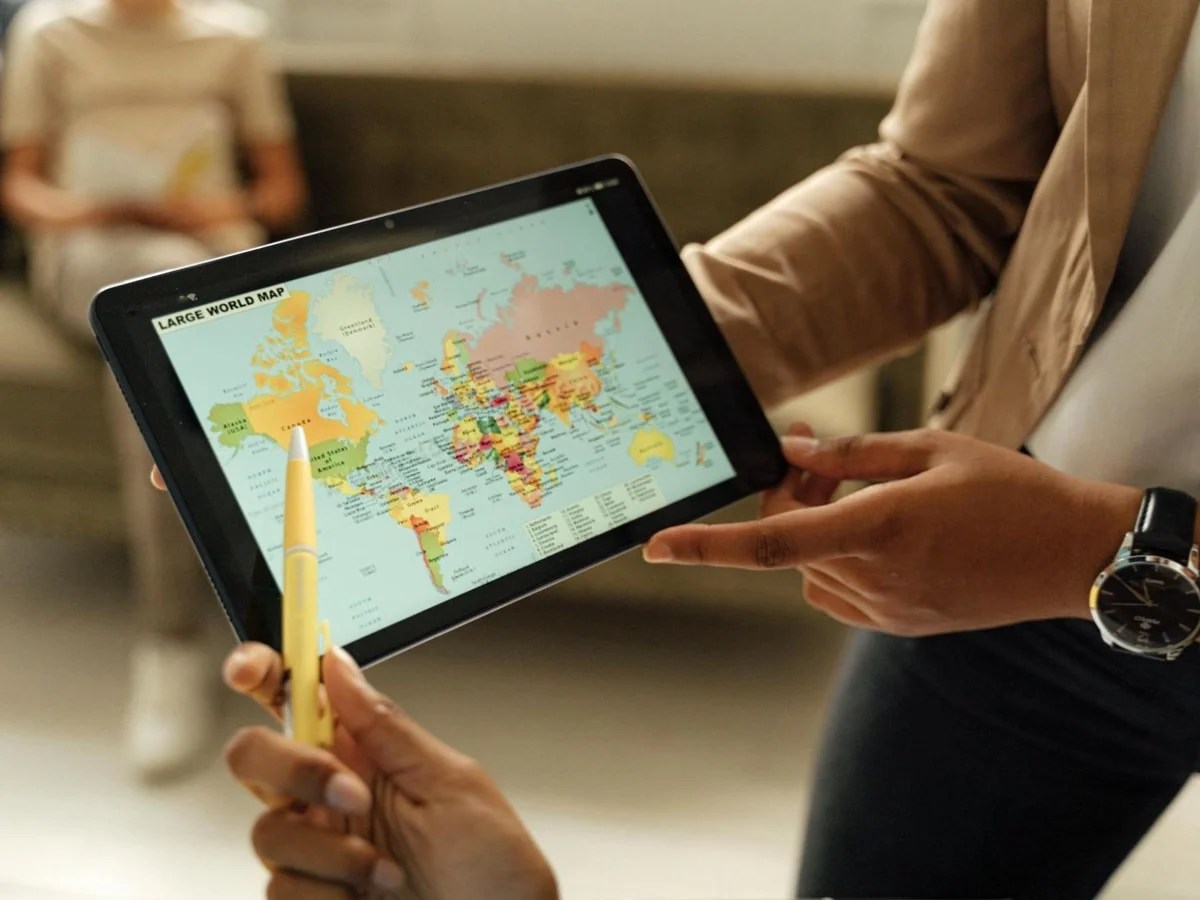
Here’s what to consider when evaluating target markets:
- Customer demand: Use tools like Google Analytics to identify where international visitors to your website are located. Track metrics like page visits, inquiries, and engagement from different countries.
- Market fit: Assess if your product aligns with local preferences, trends, and cultural nuances. Google Trends is a helpful tool for gauging interests sorted by region.
- Economic viability: Ensure the countries you’re targeting have a customer base with disposable income levels aligned with your pricing.
- The competitive landscape: Research existing competitors to understand how saturated the market is and identify any competitive advantages you may have.
- Reliable infrastructure: When considering where to focus your global sales, think about the available infrastructure in other countries. To keep overseas customers happy — and protect your company’s reputation — you’ll want to make sure that your products are delivered reliably and in a timely manner.
Focus on shipping internationally to just a few initial countries before expanding further. This will give you time to refine your processes and learn from your experiences.
2. Connect with the right international shipping partner
Selecting the right shipping company is key to ensuring efficient, reliable delivery for your international customers. Different international carriers offer varying services, rates, and delivery speeds, so research your options carefully.

Here are some options to consider:
- Major carriers: Companies like DHL specialize in international shipping, providing reliable tracking, shipping insurance options, and express delivery.
- Postal services: In some cases, partnering with the local postal service (e.g., USPS for U.S. businesses) can be cost-effective, though delivery times may be longer.
- Third-party logistics (3PL) providers: For ecommerce businesses with high order volumes, 3PL providers can manage warehousing and distribution in various countries. This can help reduce delivery times and shipping costs. DHL, FedEx, and UPS all offer 3PL services, but by contracting with them, you’d be relying on their shipping methods exclusively. If you want more flexibility in carriers and pricing, consider independent 3PLs like ShipWire.
If possible, negotiate rates with your preferred carriers based on your shipping volume. Many carriers offer bulk discounts or flexible pricing structures for businesses with high volumes of international deliveries or domestic shipping demands.
3. Determine international shipping methods
A customer’s overall shipping experience actually plays a big role in where they choose to do their online shopping. Shoppers rank free shipping, speedy delivery, and clear delivery dates as some of the top reasons to make a purchase from a particular retailer.
While some customers prioritize fast delivery, others are willing to wait longer for their order if it means they can save money. Since there’s not a one-size-fits-all solution to shipping internationally, it’s best to present multiple shipping options with clear costs and delivery dates. This allows customers to choose their shipping method based on their priorities of speed versus shipping cost.
Consider offering shipping methods like:
- Economy shipping: Economy shipping is usually the slowest shipping method — taking up to two weeks or more — and retailers may offer this, or standard shipping, as their free shipping method.
- Standard shipping: This is slightly faster than the economy shipping method but may take a week to ten days, depending on the destination and shipping carrier.
- Express shipping: Ideal for customers willing to pay more for faster delivery. While next-day delivery for international orders is not often logistically possible, express shipping methods generally offer delivery within two to three business days.
- Local pickup: If you have retail locations in the countries you ship to, you could also offer an in-store pick-up option on your website.
When setting the pricing strategy for your international shipping rates, balance affordability with your profitability. Offering free shipping on orders above a certain price threshold can give you a competitive advantage and encourage higher-order values.
4. Calculate shipping costs
Free shipping is often a great motivator for customers and makes handling shipping much easier for you as a business owner. But it’s not always practical or cost effective when shipping internationally.
When you need to charge for shipping, consider these pricing strategies:
- Carrier-calculated rates: Provide real-time shipping quotes on your website based on carrier rates, to offer the most transparent pricing.
- Flat-rate shipping: You can set flat shipping rates by region, which can simplify the checkout process. However, this may require monitoring to ensure rates remain profitable across varying package sizes and weights.
- Discounted shipping for select dates: Some businesses offer discounted shipping if you select a specific shipping or delivery date. For instance, Amazon’s Prime Day shipping offers customers a small discount or points and rewards if they choose to ship on designated Prime Days. This approach can especially help small businesses that do their own packing and shipping in-house to consolidate those efforts into one day of the week, improving operational efficiency and reducing fulfillment costs.
5. Streamline your packaging process
One of the most important parts of the international shipping process is ensuring proper packaging. When shipping overseas, you should take extra care in packing to prevent damage and control costs. And whether you’re shipping domestic sales or global orders, make sure to use your packaging to communicate your brand identity to customers.

Your packaging strategy should involve:
- Using sturdy materials: International shipments go through more handling, so using durable packaging reduces the risk of damage.
- Optimizing package size: Carriers often base shipping rates on both size and weight. Using right-sized boxes or envelopes can help control international shipping costs.
- Including accurate labels: Missing or incorrect labels can cause customs delays or even result in packages being returned. Ensure your shipping labels are clear and accurate, with all necessary customs information visible. WooCommerce Shipping simplifies this process, giving you the ability to ship UPS and DHL labels directly from your WooCommerce dashboard.
- Recognizable branding: Consider branded packaging to enhance the customer experience and reinforce brand recognition.
6. Provide tracking and shipping insurance options
Offering customers shipment tracking and shipping insurance options adds peace of mind and reduces the risk of disputes if packages are delayed or lost.
Make sure customers are notified when their order ships and that they can find their tracking number in their email or SMS text history, by logging into their account, or by searching their order number on your website if they checked out as a guest.
You can add insurance options in a few different ways. You can create a checkout add-on for international shipping insurance and assign either a fixed or percentage-based fee, use a third-party insurance provider such Route or Shipsurance, or simply build it into your shipping methods and pricing. If you opt for the latter choice, make sure to include insurance details in your shipping method descriptions.
Comply with international laws and regulations
↑ Back to topInternational shipping comes with a number of legal and regulatory considerations. You’ll need to be aware of customs duties, sales tax rates, and import restrictions and decide the best way to handle them for your business.
1. Duties and taxes
No one gets excited about the idea of calculating duty and tax on imported items. But it’s a necessary step when shipping internationally, so make sure you do your homework.
For some destination countries, you can leave any VAT calculations and collections to your delivery service. But for customer satisfaction, it’s always best if you include delivery duty and applicable taxes during checkout. If you don’t, customers may be surprised by the additional charges, which could result in negative reviews and prevent customers from coming back.
To find detailed information about a country’s customs duties, taxes, and import restrictions, visit their official customs website.
2. Customs documentation
Next up, get to know your required paperwork and customs documentation for shipping internationally. If you don’t have the right customs documentation to accompany your packages, you may experience shipping delays, package returns, or other issues with customs clearance. This might include:
- Waybills: A detailed shipping label that includes all information required for transport and delivery, as well as shipping costs.
- Invoices: A commercial invoice is often required when shipping internationally, with all products, their type, and their value listed separately.
- Additional forms for specialty and restricted items: Electronic Export Information (EEI) forms, certificates of origin, or other special case documents may be required for certain types of products.
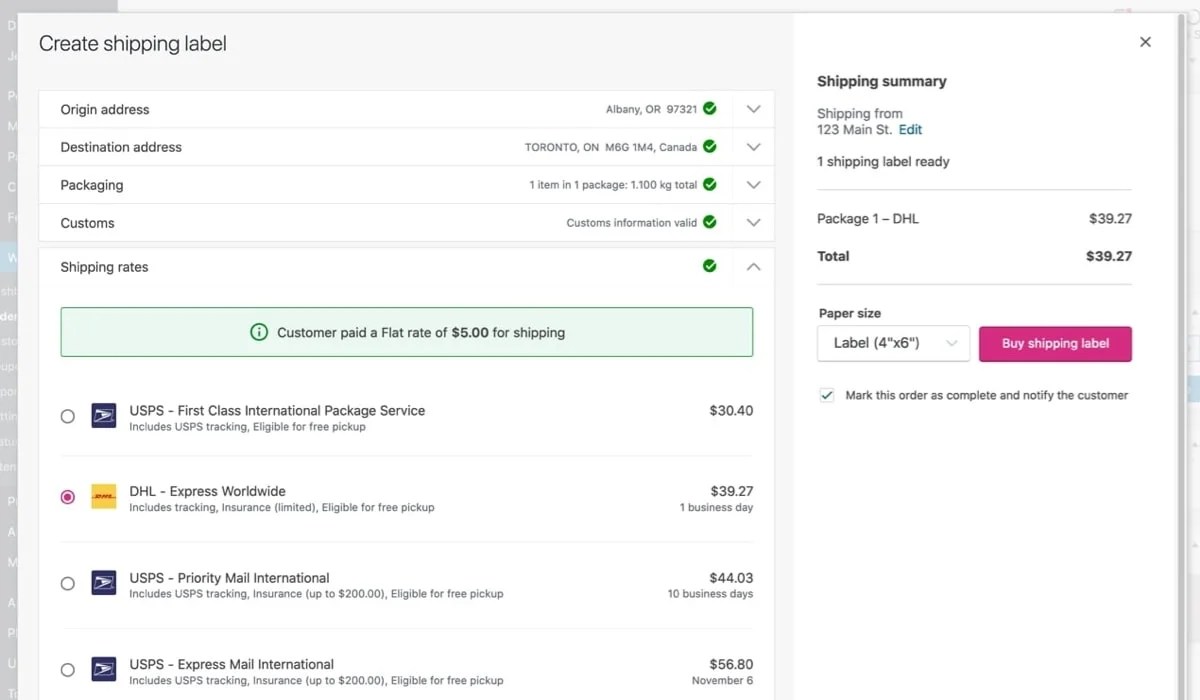
For U.S.-based stores, the WooCommerce Shipping extension is fully integrated with DHL for international shipping. This enables you to print shipping labels and invoices directly from the WooCommerce dashboard. Adding an international shipping zone when WooCommerce Shipping is active will automatically suggest DHL as an option and guide you through setup. DHL is also a recommended partner when it comes to making sure all other paperwork is in order.
3. Import restrictions
To ensure customs clearance, you’ll also need to make sure that you can legally ship the goods that you are selling to the destination country. Check with customs authorities regarding restricted product types. Some items — like live seeds, certain foods, or even books and toys — cannot be imported to some countries. Compare your list of deliverables with local customs regulations before offering them to those areas.
Set up your website for international ecommerce
↑ Back to topBefore you open up sales to international markets, there are several aspects of your ecommerce business website’s infrastructure, design, and content that you’ll need to consider. From making sure your ecommerce platform offers the international selling capabilities you need, to setting up international shipping services integrations and language localization — and that’s just the beginning. So, let’s get started!
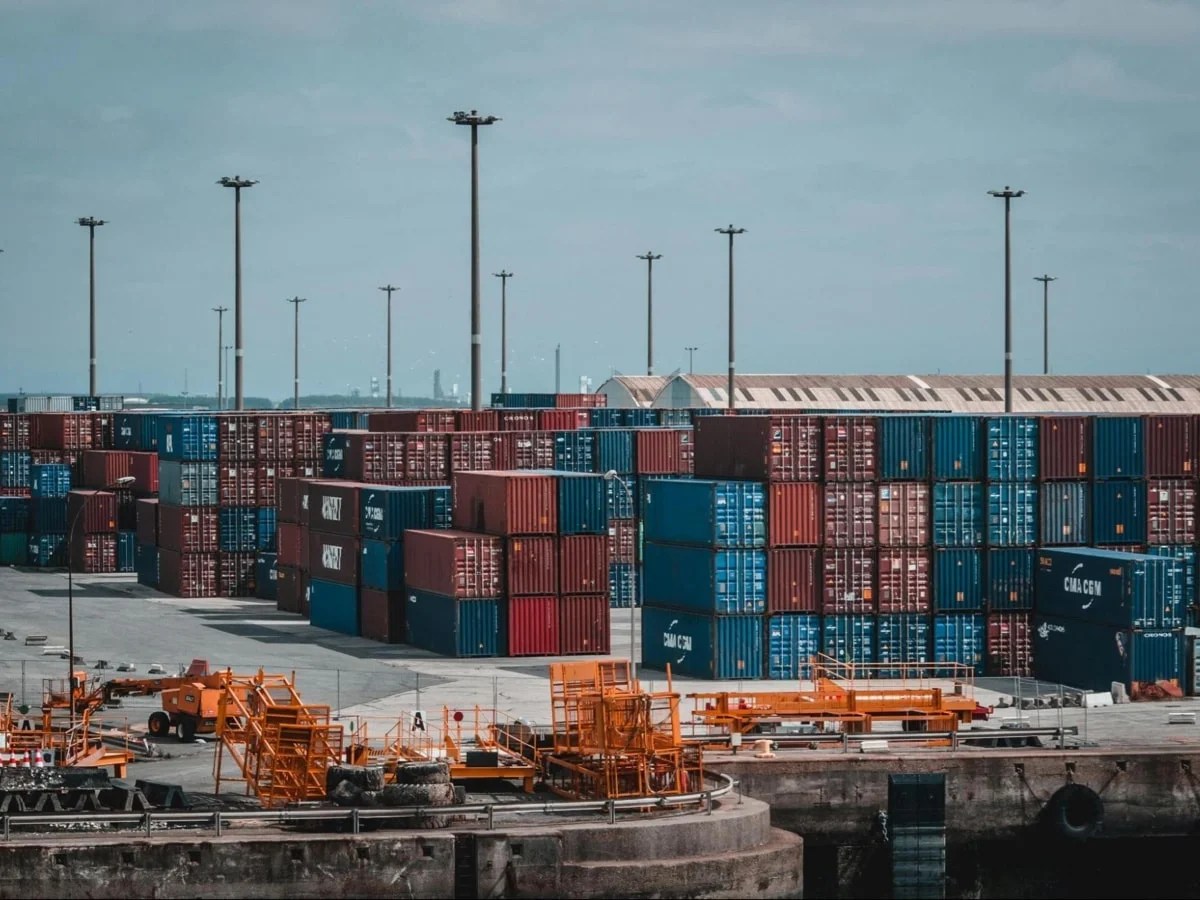
1. Choose the right ecommerce platform for international shipping
Most ecommerce platforms allow you to ship internationally anywhere your country’s carriers service. So it shouldn’t matter what platform you use, right? Well, not so fast.
While ecommerce platforms don’t restrict where you can ship to, the payment gateway you use with them might. Some ecommerce platforms offer their own proprietary payment gateways that limit what countries you can sell to. You can use third-party payment gateways to reach those other customers, but they might charge you additional transaction fees.
Some ecommerce platforms may also charge you additional monthly fees for localizing your store’s language and currencies for the countries you target. Your platform fees may also be tied to the amount of sales you make. So if you start to scale your business with international sales, you could find your monthly fees for your ecommerce platform suddenly spiking.
Fortunately there’s a free, open source solution that doesn’t rely on subscription tier-based restrictions and hidden costs — WooCommerce.
WooCommerce stands out as an international ecommerce platform because of its flexibility, affordability, scalability, and the rich ecosystem of plugins that enable internationalization features. But most importantly, unlike proprietary options like Shopify or BigCommerce, you have full access to your site’s code.
Because it’s built to work with WordPress, you can host your site with any hosting provider, install any of the thousands of free plugins from WordPress.org, as well as hundreds of free and paid extensions available from WooCommerce. You can even add your own code to enable custom functionality specific to your site’s unique needs.
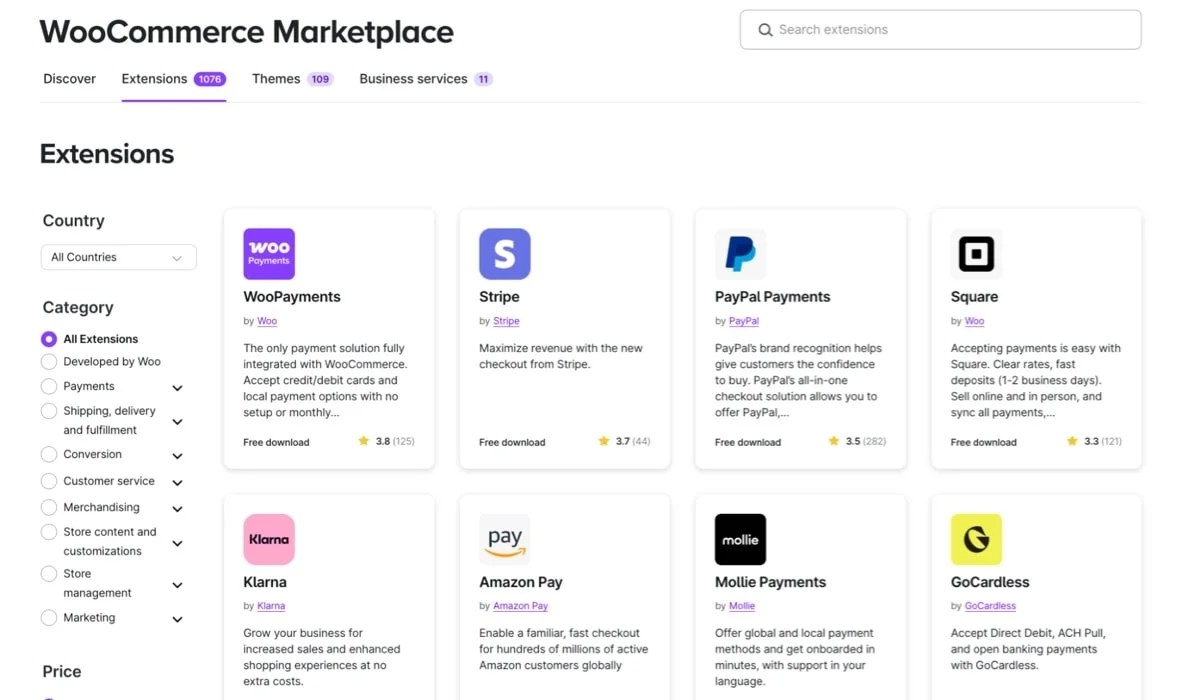
Once you’ve set up your WooCommerce store and added your products, it’s time to implement various features and settings for international ecommerce shipping.
2. Use mobile-first design principles
Mobile shopping accounts for around 70% of ecommerce sales globally. No matter where you ship, make sure your site is ready to support the full checkout process with a responsive design and flow that works well on phones and tablets.
Not sure where to start? Check out the WooCommerce theme library to find beautiful, mobile-ready themes for your store.
3. Enable geolocation and multi-currency support
International customers should be able to view prices in their local currency for an optimized shopping experience. WooCommerce offers tools and plugins to enable geolocation and multi-currency support.
- Geolocation: Go to WooCommerce → Settings → General and enable « Default Customer Location » as « Geolocation » to detect customers’ locations.
- Multi-currency: Install a currency switcher plugin like Currency Switcher for WooCommerce or WooCommerce Multi-Currency. These plugins allow you to display prices in the visitor’s local currency, improving their shopping experience.

Vein-Tap.com has a currency converter in the sidebar to keep things easy for international customers
If you’re using WooPayments, you’ll be able to display prices in your shoppers’ local currency, as well as collect payments in multiple currencies, by default.
4. Add translation support
Although English-language speakers can be found all over the world, you’ll be able to reach a much larger audience by supporting the native languages of your target countries. A study by Common Sense Advisory showed that 40% of customers simply won’t make a purchase if a website isn’t in their native language.

Removing language barriers will allow you to directly speak to customers in your target areas. It’s important to make sure your translated text is sensitive to local culture and phrasing, so do it right and get your content professionally translated.
From a tech standpoint, there are a couple different approaches you could take to translation. You could create multiple copies of your shop, each being translated into a different language, but keep inventory linked with an extension like MultilingualPress.
Another, simpler, approach would be using an extension like Webis Multilingual for WooCommerce, which provides a backend user interface for translating pages, posts, menus, products, categories, and attributes. You can add multiple languages without needing to create additional iterations of your website, eliminating concerns about syncing inventory or other content changes across sites.
5. Set up international shipping options
WooCommerce allows you to set up different shipping methods and offer international shipping rates for various regions.

To get started:
- Configure shipping zones: Go to WooCommerce → Settings → Shipping → Shipping Zones. Create specific zones for the countries or regions you plan to serve. Each zone can have multiple shipping methods.
- Shipping methods: Add shipping options like flat rate, free shipping, or real-time carrier rates. WooCommerce extensions like Table Rate Shipping for WooCommerce or WooCommerce Shipping Calculator allow more customized shipping rules.
Some shipping methods, like real-time carrier rates, may require that you input product dimensions and weight for all your products in order to calculate accurate shipping costs. If you choose to offer flat rate shipping, you may need to apply a variety of rules for combined products in a shipment or products that ship separately to ensure that you are not under-charging or overcharging customers.
6. Enable tax settings for international sales
When shipping internationally, you’ll need to make sure that you have set up the correct tax rates for each country that you ship to. You can configure tax rates directly within your WooCommerce settings. To manage these fees effectively, consider using an integration that calculates them at checkout.
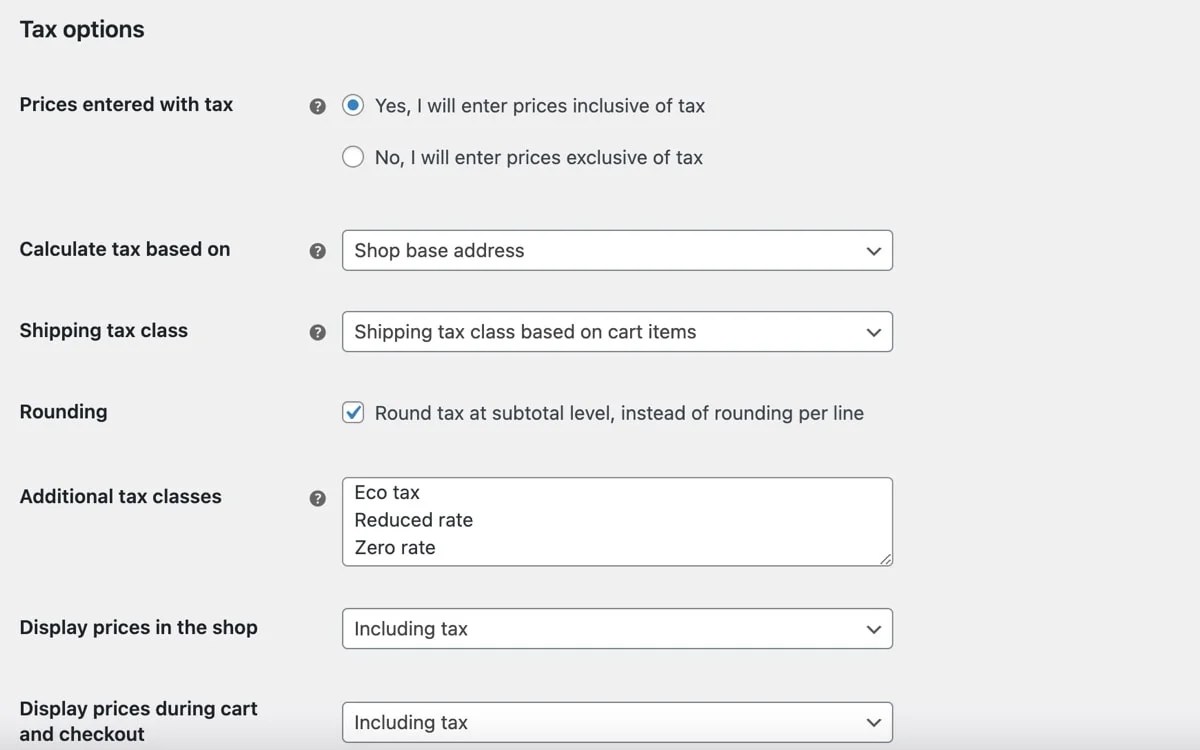
- Enable taxes: Go to WooCommerce → Settings → General and check the “Enable Taxes” option.
- Set up tax rates: Under WooCommerce → Settings → Tax, you can add standard tax rates based on different countries. WooCommerce also has plugins like WooCommerce Tax and Avalara AvaTax for WooCommerce to help you automate tax calculations.
- Display tax information: Decide how to display prices to give customers a transparent view of their total cost. You can either enter prices inclusive of tax when setting up your products or calculate taxes at checkout.
7. Add international and localized payment gateways
In many parts of the world, online transactions are often completed by eTransfer or digital wallets like PayPal, Amazon Pay, or Braintree. Since online shoppers are 70% more likely to make a purchase when a website accepts their preferred payment method, it can definitely pay off to add options to your website.
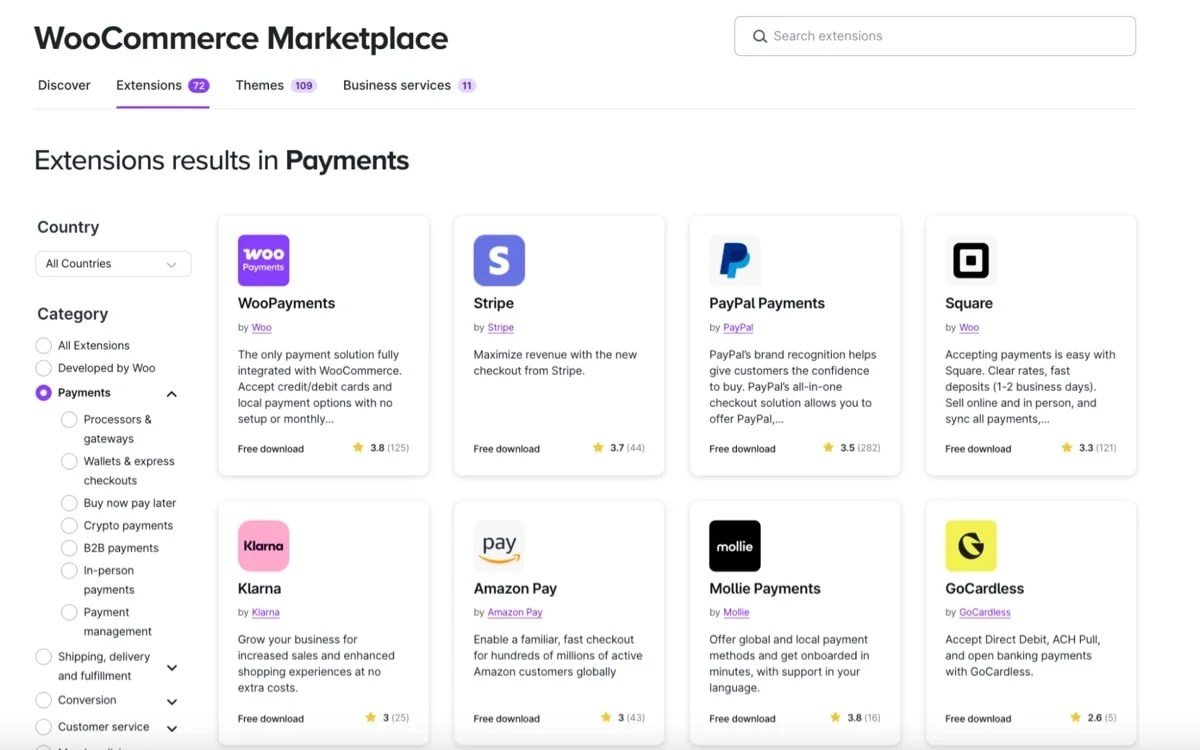
Explore the many fully-integrated WooCommerce payment extensions to get a better idea of which options may work best for the countries you wish to expand into. For U.S.-based businesses, the International Trade Administration also has a good set of videos on how to protect yourself and ensure you’re paid when exporting goods. This is especially important if you plan to sell large quantities abroad to wholesale purchasers.
- Set up payment gateways: Go to WooCommerce → Settings → Payments to add new gateways. Popular international payment gateways are WooPayments, Stripe, Amazon Pay, and PayPal.
- Digital wallets: Some payment gateways include support for digital wallets. You can substantially improve your chances of success by using gateways with support for the digital wallets most popular in the countries you want to reach.
- Local payment options: Gateways like Antom and PayPal Braintree are valuable for specific international markets. Research and enable these options to boost conversions.
8. Optimize for international SEO
Great search engine optimization (SEO) is another key element to creating a successful international ecommerce shop. Plugins like Yoast SEO Premium — and, more specifically, Yoast SEO for WooCommerce — can help you make general optimizations to your WooCommerce store for search.
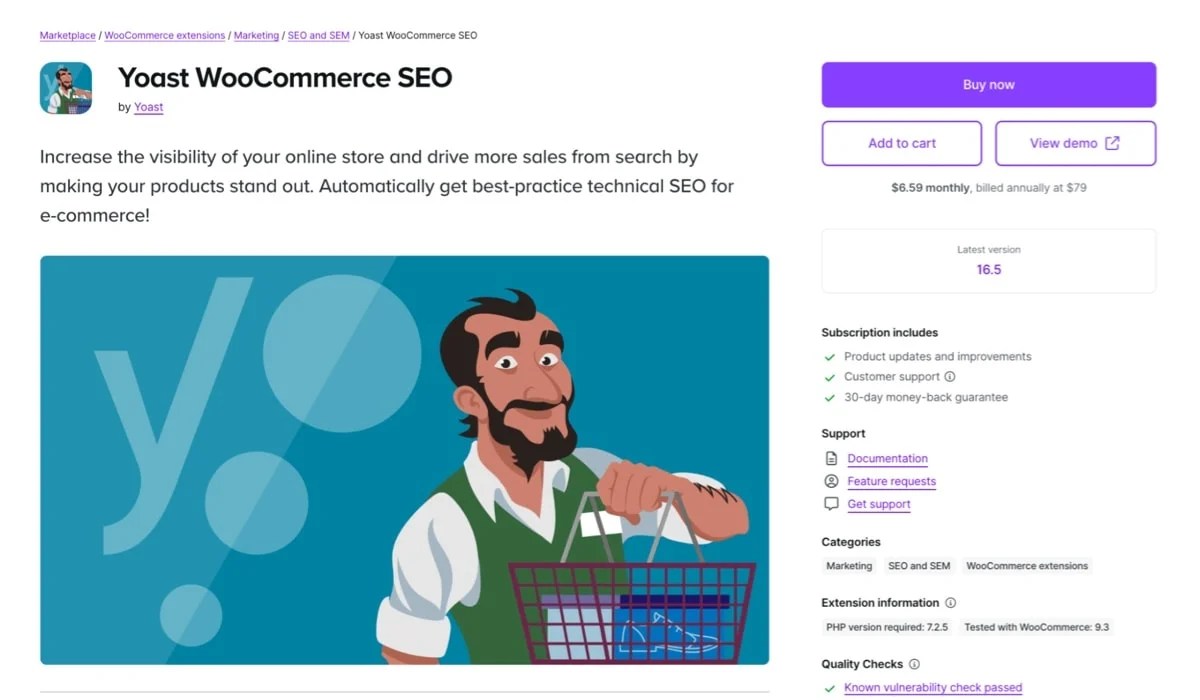
There are also specific considerations for international SEO, including:
- Creating country-specific URLs: Set up subdomains or subdirectories for each target country, such as example.com/en/ for English or example.com/fr/ for French. WPML and similar plugins offer support for these structures.
- Localizing meta tags: Make sure each translated page has localized meta titles, descriptions, and keywords.
- Implementing hreflang tags: WooCommerce supports hreflang tags to help search engines understand your multilingual pages.
Want to learn more about best SEO practices for your online store? Read A Beginner’s Guide to Ecommerce SEO.
9. Enhance customer support for international shipments
For the kind of shipping experience that will have your customers coming back for more, communication is key. Purchasers want to know exactly where their order is at all times, and when they can expect it to arrive.
When you ship internationally, a package’s journey can be more complicated than shipping domestically, so you’ll need to provide expanded customer support features. Offering reliable, detailed, and localized support for international customers will earn trust and build customer loyalty.
Here are some ways to enhance your international customer support:
- Add multilingual chat and support plugins: Tools like LiveChat and ZenDesk offer multilingual support to handle inquiries from around the world.
- Offer 24-hour support: While this may not be feasible for solopreneurs or a small business’ in-house team, you might consider outsourced solutions for phone, chat, and email support to provide coverage during hours when you or your employees are off the clock.
- Create a comprehensive FAQ section: Include answers to questions on international shipping fees (including any increased shipping costs for seasonal holidays or express shipping), customs charges, delivery timelines, taxes, returns, and exchanges.
- Include clear return and refund policies: Managing international returns can be complex. Clearly outline return policies for international packages to manage customer expectations for returns.
10. Test the overseas shopping experience
Before launching, place test orders from various countries to ensure the experience is seamless. Check for the following:
- Currency accuracy: Confirm that prices show in the correct currency at checkout.
- Proper tax calculations: Ensure taxes and duties appear as expected.
- Consistent language and translations: Review translations to ensure consistency and clarity.
- Smooth payment processes: Confirm that international payment methods work smoothly.
Adding international shipments to your ecommerce website opens up exciting growth possibilities — but only if everything works flawlessly. By properly setting up geolocation, multi-currency, international shipping, and payment gateways, you’re setting the foundation for success. Additionally, offering localized customer support and transparency with import duties and taxes can boost customer satisfaction and retention.
Build an international client base
↑ Back to topConnecting with overseas customers can take some time, so be patient. Make sure all your international shipping processes are in place for a smooth launch and iron out any kinks as the first few shoppers place orders. Once everything is working well, it’s time to put forth some marketing efforts to expand sales and create a loyal customer base.

1. Announce that you’re offering international shipping
International shoppers await, so let them know you’re ready to serve them! Use your website’s homepage, social media channels, and your email newsletters to let as many people as possible know that you’re offering international shipping.
2. Research local cultural norms and sales techniques
Use the right kind of language in the right kind of advertising to appeal to local customers. And even more importantly, make sure you are not inadvertently offending them. Local translators and marketing firms can be a good investment here to help you understand how best to access your market.
3. Build trust with customers by explaining all policies upfront
Make sure you have a very clear return policy, privacy policy, and terms and conditions page, and make all of these easily accessible on your website in multiple languages. You’ll see fewer abandoned carts when the shipping cost is added to the checkout total and options for returns are clearly stated. Be sure to allow extra return time for overseas customers and be prepared to work with your ecommerce international shipping partner to understand how the process works.
4. Use paid advertising with localized targeting
Paid advertising, such as Google Ads or social media ads, can help you reach customers actively searching for your products. Here’s how to make paid ads work for international audiences:
- Run Google Ads with localized keywords: Create separate campaigns for each country or language, using localized keywords and ad copy. This will improve your ad relevance and quality score.
- Set up geo-targeting: Configure your ads to target specific regions, countries, or cities, ensuring that your budget is focused on the most relevant audiences.
- Leverage retargeting ads: Use retargeting to reach international visitors who previously browsed your site, reminding them of products they viewed.
By targeting each market individually, you can tailor your ad messaging and maximize your ad spend efficiency.
Interested in more tips on how to increase traffic for your international ecommerce site? Check out this article: More WooCommerce traffic: Proven long and short-term strategies.
Create a successful ecommerce international shipping strategy with WooCommerce
↑ Back to topExpanding your WooCommerce store to ship internationally requires a strategic approach that considers cultural nuances, local preferences, technical optimizations, and your business goals. Invest in the right international shipping service, provide great products tailored to each international market you ship to, and use localized strategies — from SEO to social media advertising and customer support.
Remember, the key to success lies in understanding each market’s unique needs and providing a seamless, user-friendly experience tailored to an international customer base — and WooCommerce can help. Get started today or reach out to a Woo Agency Partner to help you grow your store into new global markets.
About


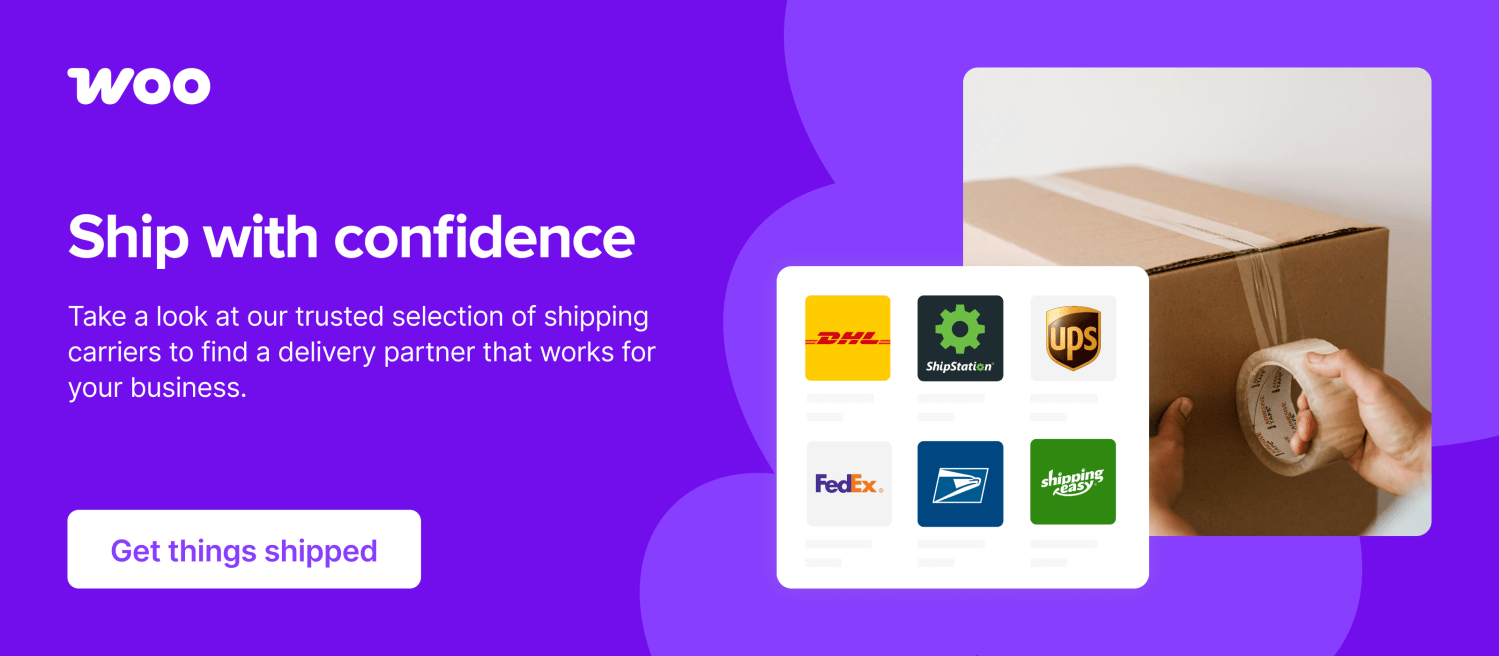





What about tracking? currently i am using https://letracking.com/abx-express-tracking/ for tracking. Do you have any other better option?
Hi Isaac! You might want to try the Shipment Tracking extension: https://woocommerce.com/products/shipment-
It integrates with a variety of shipping providers and adds tracking info to emails and account pages.